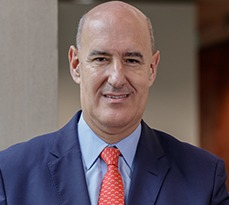Predictions are by definition an inexact endeavour: few predicted at the start of 2020 that the year would be ravaged by a pandemic, and many hoped (over-) optimistically that 2021 would be the year, by December, to look at COVID-19 (coronavirus) through the rear-view mirror rather than face yet more restrictions.
That hasn’t stopped us from taking a stab at 2022, as some of our faculty look ahead to the trends that might shape our lives this year in areas ranging from energy to the economy to our own role as business educators.
Here are some insights, and personal opinions, of seven Cambridge Judge Business School faculty on the year ahead, beginning with an introduction by our new Dean to many of the areas explored by others:
Professor Mauro F Guillén, Dean of Cambridge Judge Business School, on the need for a patient approach to deal with our uncertain times:

Business schools are designed to explore society’s grand challenges, and to help educate future leaders of companies and other organisations to meet those challenges. Yet 2022 will be a year in which business schools – and other sectors of society – needs to be patient as we find new and better ways of living with a virus that may be with us for some time to come, if not always, in some manageable form. In short, we need a mindset shift away from “post-pandemic” toward patient new approaches regardless of the course of this virus.
How can we as educators be more patient? We need to accept that, like much office work, education is not going back to pre-pandemic ways in 2022 and beyond. The potential of digital platforms and online learning, accelerated owing to necessity in 2020 and 2021, has proved successful in many ways. So we need to experiment further, sort out what works best and what doesn’t, and be open to yet more new pedagogies in order for business education to emerge stronger than before the world ever heard the words “COVID” or “coronavirus”.
Patience extends to the geopolitical grand challenges of defusing the world’s many tensions, as there is often no quick fix to territorial and other issues that have lingered for decades and sometimes even centuries. So we need to ask our political leaders to exercise care and patience in 2022, because talking around a table – even if rounds of difficult conversation yield no results – is better than armed conflict.
Consumers in developed countries have come to expect goods and services in a virtual heartbeat, but supply chain bottlenecks springing from the pandemic will require patience on this front as well. Inflation worries abound as 2022 begins, and price rises can be tempered if consumers and workers alike tamper expectations. It will take some time for the world economy to find a new equilibrium: hopefully that will begin in 2022, but this may be two steps forward, one step back – as it’s a process rather than a one-off event.
Climate change was front and centre as 2021 drew to a close, with the COP26 conference bringing world leaders to Glasgow in November, but battling climate change is also a continuous process rather than a diary entry. Patience is paramount, but patience doesn’t mean sitting on our hands: we need to work toward zero emissions one step at a time, and in a way to ensures that some in our society are not disadvantaged by new measures put in place. They don’t call it a climate change “crisis” for nothing, but sometimes crises are best dealt with through realistic and patient goals.
Jennifer Howard-Grenville, Diageo Professor in Organisation Studies, on the need for climate change action:

As we enter 2022 we are looking for evidence that business and others are moving climate-change commitments into action, as it’s time for us all to roll up our sleeves and create the changes that will deliver on aspirations articulated in the previous 12 months.
The COP26 conference in November focused the minds of so many – governments, business, the investment community, NGOs, and the public – as the past year gave us even more reason be concerned about what is in store as a result of climate change: devastating flooding, forest fires, and extreme heat around the globe, and often close to home.
While businesses continued to commit to decarbonise and achieve net zero emissions, other important shifts were under way. Leading companies have started to consider their climate actions as needing to work alongside interdependencies with nature, social equity, and other pressing issues. In 2022 and beyond, addressing these issues holistically and systemically will be key to effective action with fewer unintended consequences.
Michael Kitson, Associate Professor in International Macroeconomics and Director of the MBA Programme, on economic volatility and political nationalism, and what he views as government hypocrisy:

In 2022 we can expect more global uncertainty, volatility and disruptions driven by the toxic combination of COVID, rising nationalism and disinformation.
We may hope that COVID will burn itself out, but this is far from certain, and in the meantime the variable access to vaccines means that poor countries are being left behind; this will prolong the pandemic and the restrictions needed to limit its spread.
Vaccine nationalism – where high-income countries prioritise access to vaccines to their domestic population – is just one more addition to the raft of protectionist measures that many countries have introduced in the last decade. Such protectionism will severely limit the scope to deal with global challenges such as climate change. At worst, it may lead to geopolitical conflicts: in particular, the flashpoints between Russia and Ukraine and China and Taiwan may boil over with global repercussions.
These tensions are intensified by a world where lies and disinformation now often have more currency than evidence and truth. Facts used to play an important role as the check and balance against political deceit or business deception, but this is increasingly no longer the case. Falsehoods, fabrications and conspiracy theories spread across social media like a virus of vitriol where many don’t care they are reading make-believe and lies.
Like many people in the UK, I was outraged that an incompetently hypocritical Government tells people to do one thing while itself doing exactly the opposite – as shown by a photograph of a wine-and-cheese frolic in the Downing Street garden involving the Prime Minister and other officials. So if we can take any succour from that omnishambles, it is that in 2022 we can take a cue from the Government and attend our work meetings without the clutter of computers, pens or paper – while we get well-oiled on a decent claret and keep our cholesterol levels reassuringly high with some well-aged Stilton.
Allègre Hadida, Associate Professor in Strategy, on the outlook for cultural organisations:

In 2022, more than ever, the cultural sector needs government patronage to survive and to safely allow us to return to the unparalleled delights of diverse in-person gatherings and cultural experiences.
Without continued public support, the prolonged effects of the pandemic will be lethal for cultural organisations – and government support needs to be revised and adapted as the pandemic evolves. For instance, a £750 million UK government-backed insurance scheme now needs to move away from only offering compensation for cancellations caused by lockdown measures to also covering losses associated with the reintroduction of social distancing measures and with staff or performers testing positive for coronavirus.
The cultural sector has been powering through sweeping cancellations, temporary closures, increased safety protocols, and reduced capacity measures. Venues have demonstrated that they can prioritise staff and patrons’ safety and remain open, while patrons have been generally understanding and appreciative of the efforts made to keep them safe. Still, some shows, venues, and producers may not go on. Smaller organisations, in particular, are severely impacted by the need to operate at reduced capacity and under stringent safety protocols, the reduction of income from concessions, and competition for exclusive content from streaming services. Many of them are now fighting for survival. What happens to the community when the local cinema or theatre, which is also the only cultural venue in town, shuts down for good?
David Reiner, Associate Professor in Technology Policy, on fuel-price rises and fuel-price politics:

One prediction for 2022 is relatively easy. The so-called price cap on electricity in the UK actually just delays prices reaching consumers until the following April; so the sharp rises in wholesale natural gas prices that we saw over the autumn will make their way through to household bills in the spring, and this will likely mean great consumer unhappiness. In turn, the potential for a populist (over-) reaction by governments to deal with public outcry is a harbinger of some of the challenges of reaching net-zero emissions by mid-century.
We all know that to address the climate problem we will need to see fossil fuel prices rise dramatically over the coming years. The problem is that such price rises have both distributional impacts and have the potential of stimulating a backlash. One example of this was the “gilets jaunes” (yellow vests) protests in France, which began in 2018, where hundreds of thousands took to the streets and motorways to express their unhappiness with President Macron’s proposed fuel tax increase. One lesson from France is that it is not simply that consumers don’t like price rises but that the perceived fairness of any such measures is also crucial.
Pulling in the other direction, protests demanding far greater climate action have continued despite pandemics and lockdowns. From Fridays for the Future, inspired by Greta Thunberg to Extinction Rebellion and Insulate Britain, many activists can justifiably point to the actions of politicians and firms not matching their words. It is just possible that 2022 might be the year when these two countervailing protests (and worldviews) collide.
Mark de Rond, Professor of Organisational Ethnography, on a retreat into smaller worlds as social media erodes wider trust:

As we clock out of yet another year, there’s little indication that 2022 will provide respite from a shift, in several countries, towards nationalism, nativism and fascism – as such complex challenges as race relations, climate, inequality and migration have been met with demagoguery or disinterest by those in charge, and recourse to social media for the rest of us.
But rather than help heal social divisions, these platforms have made is easier to find sympathetic others. In the company of friends, our suspicions and our fictions have amplified. Two of many casualties of this trend are old-fashioned but imperative to the functioning of society: decency and trust.
If I had to make one prediction for the next 12 months, it wouldn’t be a return to a safer and less anxious world (however much I’d like for this to happen) but a retreat by people into smaller worlds. No longer knowing who and what we can trust, I suspect that many of us will tighten the belt around our communities to those whose whites of the eyes we can see.
We are less likely to betray those we meet repeatedly (our neighbours, friends, family members) and have actual stakes in maintaining good relations with. We will rely on the Internet for what we need to live – our groceries and books and electronics and news – but draw our emotional sustenance, our ontological security, and the experience of feeling alive from those nearest us.
Stella Pachidi, Assistant Professor in Information Systems, on the rise of new workplace technologies at home or the office:

The pandemic in 2020 and 2021 prompted organisations across all sectors to seek technological approaches to the at-home or hybrid working environments they were forced to adopt just to stay afloat. In 2022, business leaders will increasingly realise they need to aggressively shift gears and think more strategically how to embrace technology to create, deliver and capture added value for their customers, staff and other stakeholders.
The latest developments in algorithmic technologies such as explainable artificial intelligence and the growth of robotic process automation tools (just two of many examples) are now affecting not only the big players, but even smaller businesses given the large variety of off-the-shelf tools becoming available. Yet this digital transformation process carries managerial challenges – such as sourcing digital talent in incumbent organisations, embracing new ways of producing knowledge and making decisions, and adjusting patterns of coordination. So 2022 will also be a year in which organisations invest in digital leadership rather than only digital gizmos.
Videoconferencing technologies have been around for a long time, but the pandemic made Zoom a household world. As we move into 2022 and further into the 2020s, don’t be surprised if other technologies now considered niche become ubiquitous in offices both physical and remote, thus becoming new household words.
Vincent Mak, Professor of Marketing & Decision Sciences and Vice-Dean for Programmes & Research, on business education as a democratiser:

For business educators, the year 2022 will see the refinement of the blended learning techniques we engaged with over the past two years in a way that enhances the overall experience for students. We now know that programmes of the highest quality can be delivered online, and we also know that many students crave in-person interactions – and, importantly, that a “hybrid” pedagogical approach can enhance both elements.
These developments will also give a strong boost in the coming year to lifelong learning in the realm of business education. This will include a further broadening of the participant base of business education that brings people together across age groups and other demographic boundaries. This development chimes with our goals of boosting equality, diversity, and inclusion, as business education is increasingly seen as something that is useful for everyone who seeks to make a mark on society and enrich the lives of others. I hope that 2022 will be a year in which business education will come further to the fore as a democratic enabler of personal potential, and a force for good as well as for prosperity.


